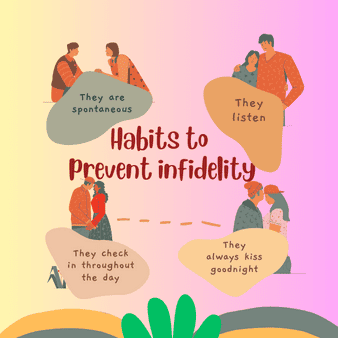Hello and welcome to the Lover’s Mindset podcast, where we talk about all things related to love, relationships, and personal growth. I’m your host, Leo Bastien, and today we’re going to discuss a very important topic: Effective communication to prevent infidelity.
Infidelity is one of the most common and devastating causes of relationship breakdowns. According to some studies, about a quarter of marriages include infidelity, and even more people cheat in non-marital relationships. Cheating can have lasting effects on both the betrayed and the betrayer, such as loss of trust, guilt, anger, resentment, depression, anxiety, and low self-esteem.
But why do people cheat? And more importantly, how can we prevent it from happening in our relationships? Well, there is no simple answer to these questions, as every situation is different and complex. However, one thing that most experts agree on is that communication is key. Communication is the foundation of any healthy and happy relationship, and it can also be a powerful tool to prevent infidelity.
In this episode, I’m going to share with you 4 tips and strategies on how to communicate effectively with your partner, and how to create a safe and supportive space for honesty, openness, and vulnerability. By doing so, you can strengthen your bond, increase your intimacy, and reduce the risk of cheating.
So, let’s get started. Here a 4 tips to help develop effective communication to prevent infidelity.
Tip #1: Define what crosses the line for each of you.
One of the first steps to prevent infidelity is to have a clear and mutual understanding of what constitutes cheating in your relationship. Different people may have different definitions and boundaries of what is acceptable and what is not.
For some, cheating may only involve physical contact, such as kissing or sex. For others, cheating may also include emotional or online interactions, such as flirting, texting, or sexting.
The best way to avoid confusion and conflict is to have an honest and respectful conversation with your partner about what you consider cheating, and what you expect from each other in terms of fidelity.
Don’t assume that your partner knows or shares your views, and don’t judge or criticize their views either. Instead, listen actively and empathetically, and try to understand their perspective. Then, come to an agreement and set boundaries that you both actively created and feel comfortable with.
Tip #2: Express your needs and feelings regularly.
Another way to prevent infidelity is to communicate your needs and feelings to your partner on a regular basis. Sometimes, people cheat because they feel unfulfilled, unhappy, or neglected in their relationship. They may seek validation, attention, affection, or excitement from someone else because they don’t get enough of it from their partner.
To avoid this scenario, you need to make sure that you and your partner are meeting each other’s needs and making each other feel valued and appreciated. Don’t expect your partner to read your mind or guess what you want or need. Instead, be open and direct about what you desire and how you feel. For example, you can say things like:
– I need more quality time with you.
– I feel lonely when you work late every night.
– I appreciate it when you do the dishes for me.
– I love it when you hug me from behind.
– I want to try something new in the bedroom.
By expressing your needs and feelings, you can also invite your partner to do the same and create a dialogue that fosters mutual understanding, respect, and satisfaction.
Tip #3: Listen actively and empathetically to your partner.
Effective communication to prevent infidelity is not only about talking but also about listening. Listening is a skill that requires attention, patience, and compassion. When you listen to your partner, you show them that you care about what they have to say and that you are interested in their thoughts and feelings. Listening also helps you to learn more about your partner, and to discover their needs, wants, fears, and dreams.
To listen effectively, you need to avoid distractions, interruptions, and judgments. You also need to use verbal and non-verbal cues to show that you are engaged and attentive, such as nodding, smiling, or saying “uh-huh” or “I see”.
You also need to ask open-ended questions to encourage your partner to elaborate, such as “How did that make you feel?” or “What do you think about that?”. And finally, you need to paraphrase or summarize what your partner said, to show that you understood them, and to clarify any misunderstandings.
By listening actively and empathetically, you can make your partner feel heard, validated, and supported, and you can also deepen your connection and trust.
Tip #4: Create a safe space for vulnerability
One of the most important aspects of communication is vulnerability. Vulnerability is the ability to be honest and authentic and to share your true self with your partner, including your strengths, weaknesses, hopes, fears, and secrets. Vulnerability is also the willingness to take risks and to expose yourself to potential rejection, criticism, or hurt.
Vulnerability is not easy, and it can be scary. But it is also essential for intimacy, and intimacy is essential for preventing infidelity. When you are intimate with your partner, you share a bond that is unique and special, and that no one else can replace. You also create a sense of security and loyalty, and a commitment to protect and cherish each other.
To be vulnerable with your partner, you need to create a safe space for both of you to open up and be yourself. A safe space is a space where you feel comfortable, accepted, and respected, and where you can express yourself without fear of judgment, ridicule, or betrayal. A safe space is also a space where you can give and receive feedback, support, and encouragement, and where you can resolve conflicts constructively and peacefully.
By creating a safe space, you need to be respectful, compassionate, and trustworthy. You also need to be consistent, reliable, and faithful. And you also need to be courageous, curious, and adventurous. By creating a safe space, you can foster a culture of vulnerability, and a relationship that is strong, healthy, and resilient.
So, these are some of the tips and strategies on how to have effective communication to prevent infidelity and communicate effectively with your partner, and how to prevent infidelity in your relationship. I hope you found them useful and helpful, and I encourage you to try them out and see how they work for you.
Remember, communication is not a one-time thing, but a continuous and ongoing process. Communication is also a two-way street, and it requires both partners to participate and cooperate. Communication is not always easy, but it is always worth it.
Thank you for listening to the Lover’s Mindset podcast, and I hope you tune in again next time when we will talk about another interesting and relevant topic. Until then, stay safe, stay healthy, and stay in love. Bye for now.


Leave a Reply